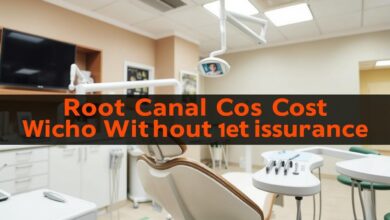Single Tooth Implant Cost Without Insurance
Are you thinking about getting a single tooth implant but worried about the cost? You’re not alone. Many people struggle to pay for dental implants without insurance. The cost of dental implants seems high, but knowing what affects the price can help you decide.

Looking for affordable dental implant options? It’s key to understand the cost and what you get for it. Start by looking up and comparing prices at different dental clinics and implant specialists.
Key Takeaways
- Understand the factors that affect the cost of single tooth implants.
- Explore affordable dental implant options in your area.
- Research and compare prices from different dental clinics.
- Consider the overall cost and what’s included in the price.
- Consult with implant specialists to get a personalized quote.
What You Need to Know About Dental Implants
Thinking about dental implants? It’s key to know how they work and why they’re good. They’re a top choice for missing teeth, giving a natural look and feel.
The Structure and Components of Dental Implants
Dental implants have three parts: the implant, the abutment, and the crown. The implant is a titanium post put in the jawbone. It acts as a base for the new tooth. The abutment links the implant to the crown, which is the tooth you see.
Titanium is used for its durability and biocompatibility. This means it’s strong and safe for the bone.
Why People Choose Implants for Tooth Replacement
Many choose dental implants for good reasons. They offer a permanent solution to tooth loss. They improve how your mouth looks and works. Unlike dentures, implants stay in place, making eating and speaking easier.
“Dental implants are a game-changer for individuals with missing teeth, restoring their confidence and quality of life.”
Knowing about dental implants helps you make a smart choice for your teeth. Whether you need one or many, implants are a solid, lasting option.
Single Tooth Implant Cost Without Insurance
Knowing the cost of a single tooth implant without insurance is key. It helps you make smart choices about your dental health. The price can change based on where you live, the dentist’s skill, and the materials used.
National Average Price Ranges
The average cost for a single tooth implant is between $3,000 and $6,000. This includes the implant, abutment, and crown. But, extra steps like bone grafting can make it more expensive.
Here’s a simple cost breakdown:
| Procedure | Average Cost |
|---|---|
| Implant Fixture | $1,500 – $3,000 |
| Abutment | $300 – $1,000 |
| Crown | $1,000 – $2,000 |
| Total | $3,000 – $6,000 |
Cost Variations by Region in the United States
Prices differ a lot across the U.S. Places like New York or Los Angeles cost more because of living costs. Smaller towns or rural areas are often cheaper.
Urban vs. Rural Price Differences
Urban areas charge more because of demand and costs. Rural areas might be cheaper but have fewer options.
When thinking about a single tooth implant, consider these points. It’s wise to talk to several dentists to find the best deal without sacrificing quality.
Complete Breakdown of Implant Treatment Expenses
To understand dental implant costs, it’s key to look at each treatment stage and its price. Knowing what you’re paying for helps plan your dental care budget.
Initial Consultation and Diagnostic Fees
The first step is an initial consultation, costing $100 to $500. This includes X-rays and 3D scans to check your bone density and plan your implant.
Surgical Placement of the Implant
The implant surgery is a big part of the cost, from $1,000 to $3,000 per implant. This includes the surgeon’s fee, the implant, and facility costs. The complexity and the surgeon’s skill can affect this price.
Abutment and Crown Costs
After the implant, you’ll need an abutment and crown, adding $500 to $3,000. The crown’s material greatly influences the cost.
Material Options and Their Price Points
Material choices for your crown can greatly affect costs. For example:
- Porcelain crowns are popular for their look and durability, costing $800 to $1,500.
- Zirconia crowns are strong and natural-looking, priced $1,000 to $2,000.
- Gold or precious metal crowns are durable but less common, costing $1,500 to $3,000.
Talking to your dentist about these options can help you choose wisely, balancing cost and quality.
Understanding these parts helps you navigate dental implants better and make informed choices about your care.
Factors That Significantly Impact Your Final Implant Cost
When you think about getting a single tooth implant, knowing what affects the cost is key. The price of a dental implant can change based on several important factors. It’s vital to understand these to make smart choices about your dental health.
Dentist Credentials and Specialization
The skill level of your dentist can really impact the cost. Specialists like periodontists or oral surgeons might charge more because of their advanced training. Even though a cheaper option might seem appealing, a skilled dentist can lead to better results and might save you money in the long run.
Practice Location and Overhead Costs
The place where your dentist’s office is located also plays a big role in the cost. Dental practices in cities or areas with high living costs might charge more to cover their expenses. On the other hand, offices in rural areas might offer lower prices. While saving money by traveling for your procedure is possible, it also comes with extra costs for travel and staying away from home.
Additional Procedures You Might Need
Some people might need extra steps to make sure their implant works well. These could be things like bone grafting, sinus lifts, or other prep work, which can increase the total cost.
Bone Grafting Expenses
Bone grafting is needed when the jawbone isn’t strong enough for the implant. This can make your treatment more expensive, depending on the type and amount of materials used.
Sinus Lifts and Other Preparatory Work
If you don’t have enough bone in the upper jaw, a sinus lift might be needed. Other prep work, like ridge augmentation or moving nerves, also comes with its own costs.
- Talk to your dentist about any extra steps you might need and their costs.
- Think about the value of your treatment, including your dentist’s skill and the quality of care.
- Look into financing options or payment plans to help with the upfront costs.

Knowing about these factors can help you understand the process of getting a single tooth implant better. By considering your dentist’s skills, the location of their office, and any extra steps you might need, you can make a more informed choice about your dental care.
Affordable Alternatives to Traditional Dental Implants
If you’re looking for ways to save money on dental implants, there are options. Traditional implants are popular but can be pricey. Luckily, new dental tech offers cheaper alternatives that work well.
Mini Dental Implants and Their Cost Benefits
Mini dental implants are a cheaper, less invasive choice. They need smaller cuts and less bone, perfect for those who can’t get regular implants. They save money because they’re simpler to put in and need fewer dentist visits.
Implant-Supported Bridges for Multiple Missing Teeth
For those missing many teeth, bridges supported by implants are a budget-friendly option. They use a few implants to hold a bridge, saving money by replacing more teeth at once.
Non-Implant Options and Their Price Comparison
Options like dentures or bridges are cheaper but not as long-lasting as implants. Think about the upfront cost and how long they’ll last before deciding.
Looking for cheaper dental implant options? Talk to a dentist to find the best fit for your budget and needs. They can guide you through the choices, helping you make a smart decision.
Ways to Reduce Your Single Tooth Implant Expenses
Looking for ways to cut down on single tooth implant costs? There are several strategies to make them more affordable. You can explore alternative options to save money.
Dental Schools and Teaching Institutions
Dental schools are a cost-effective choice for single tooth implants. They offer treatment at a lower price because students get hands-on experience. The quality of care is usually high, even if it takes longer.
A study showed patients at dental schools were very happy with their implant procedures. To find a dental school near you, ask local universities or dental associations for recommendations.
Dental Tourism Considerations
Dental tourism is another way to save on single tooth implants. Countries like Mexico, Costa Rica, and Hungary offer dental care at lower prices than in the U.S. But, it’s important to do your research.
Look beyond the cost. Check the dentist’s qualifications, the facility’s standards, and follow-up care. Make sure the clinic has good reviews and meets international standards.
Discount Dental Plans and Membership Programs
Discount dental plans and membership programs can also lower your costs. These plans offer discounted rates for dental procedures, including implants, for an annual or monthly fee.
Here’s a comparison of average costs for single tooth implants with and without discount plans:
| Service | Average Cost Without Plan | Average Cost With Plan |
|---|---|---|
| Single Tooth Implant | $3,000 – $4,500 | $2,000 – $3,000 |
| Abutment and Crown | $1,000 – $2,000 | $800 – $1,500 |
By exploring these options, you can lower your single tooth implant costs. Always do your research and talk to dental professionals to make an informed choice.
Financing Options When You Don’t Have Insurance
Without insurance, financing is key for a single tooth implant. The cost is high, but there are ways to make it easier.
Healthcare Credit Cards and Medical Financing
Healthcare credit cards, like CareCredit, are a good choice. They’re made for medical and dental bills. They offer payment plans to fit your budget.
These cards often have special deals. For example, no interest if you pay off the balance in a set time.
In-Office Payment Plans and Discounts
Dental offices have their own financing plans. You can pay for your implant over time. Some offices give discounts for paying upfront or for those without insurance.
It’s smart to ask your dentist about these deals.
Personal Loans and Alternative Financing Methods
Personal loans from banks or online lenders are another choice. You can also look into dental savings plans or membership programs. These offer lower rates on dental work, including implants.
When looking at financing options, keep these points in mind:
- Interest rates and repayment terms
- Any associated fees or penalties
- The total cost of the financing option
- Whether the financing option affects your credit score
Exploring these options can make the single tooth implant price range more manageable. Talk to your dentist about your financial situation. They can help find the most affordable tooth replacement options for you.
Essential Questions to Ask Before Committing to Treatment
Dental implant treatment is a big investment. Asking the right questions can help you make a smart choice. It’s key to know the treatment process, costs, and what your dentist can do for you.
Understanding the Complete Treatment Timeline
The time it takes for dental implant treatment varies. Your dentist should give you a clear timeline. This includes how many visits you’ll need and how long each stage takes.
Identifying All Possible Costs Upfront
Knowing all costs upfront is important to avoid surprises. Your dentist should break down the costs for you. This includes the implant, abutment, crown, and any extra procedures. This helps with dental implant cost comparison and planning.

| Procedure | Cost Range | Factors Affecting Cost |
|---|---|---|
| Dental Implant | $1,000 – $3,000 | Implant material, brand, and quality |
| Abutment | $300 – $1,000 | Type of abutment, material, and complexity |
| Crown | $500 – $1,500 | Material, craftsmanship, and aesthetics |
Warranty and Follow-up Care Questions
It’s also important to ask about the warranty and follow-up care. Find out about the warranty’s length, what it covers, and how to keep your implant in good shape.
By asking the right questions, you can have a smooth treatment process. This helps you make a well-informed decision about your dental implant treatment.
Long-Term Value: Is a Dental Implant Worth the Investment?
When you think about replacing teeth, dental implants might seem pricey at first. But, they are a big investment in your mouth’s health. They last for many years with the right care.
Longevity Compared to Other Tooth Replacement Options
Dental implants are known for lasting a long time. They outlast dentures, which need replacing every 5-10 years. This makes implants a smart choice for your wallet in the long run. Here’s how different options compare:
| Tooth Replacement Option | Average Lifespan |
|---|---|
| Dental Implants | 20-30+ years |
| Dentures | 5-10 years |
| Bridges | 10-15 years |
Health Benefits Beyond Aesthetics
Dental implants do more than just look good. They help keep your jawbone strong by making it grow. This stops bone loss from missing teeth, keeping your face healthy.
Implants also make eating and talking easier. They don’t move around like dentures do. This makes them more comfortable and reliable.
Quality of Life Improvements
Dental implants can really change your life. They make your smile better and help you eat and talk with ease. This boosts your confidence and happiness.
Choosing affordable dental implant options or low-cost dental implants is a smart move. It’s not just about replacing a tooth. It’s about taking care of your health and happiness for years to come.
Conclusion
Exploring dental implants, you’ve found that the cost for a single tooth implant without insurance varies a lot. Things like where you live, the dentist’s qualifications, and extra procedures affect the price.
The average cost for a single tooth implant is quite high. Prices can change based on whether you’re in a city or a rural area. You’ve learned about the costs of the first visit, the surgery, and the crown and abutment.
Even though the cost might seem high, dental implants are a long-term investment. They can greatly improve your life and last for many years with the right care. When thinking about getting an implant, ask important questions and look into payment plans to make it more affordable.
Knowing what affects the cost of a single tooth implant helps you make a smart choice. This way, you can find the best option for you.
FAQ
What is the average cost of a single tooth implant without insurance?
The cost can vary from $3,000 to $6,000. This depends on location, dentist skill, and extra procedures needed.
Are there affordable alternatives to traditional dental implants?
Yes, there are cheaper options. Mini dental implants, bridges, and non-implant solutions cost between $500 and $3,000.
How can I reduce the cost of my single tooth implant?
Look into dental schools, dental tourism, or discount plans. They can cut costs by up to 50%.
What financing options are available for dental implants without insurance?
You can use healthcare credit cards, in-office plans, personal loans, or other financing options. This makes treatment more affordable.
What factors can significantly impact the final cost of my dental implant?
The dentist’s skills, location, and extra procedures like bone grafting affect the cost. So does the material used.
Are dental implants worth the investment in the long run?
Yes, they last long, improve health, and quality of life. They’re a good investment despite the initial cost.
How can I find the best dentist for my single tooth implant?
Research local dentists, check their credentials, and read reviews. Ask for referrals to find a skilled dentist at a fair price.
What are the benefits of choosing a dental implant over other tooth replacement options?
Dental implants look and feel natural, improve health, and last long. They’re a top choice for replacing teeth.
Can I get a single tooth implant if I have bone loss or other oral health issues?
Yes, but you might need bone grafting first. This can increase the cost of the implant.



